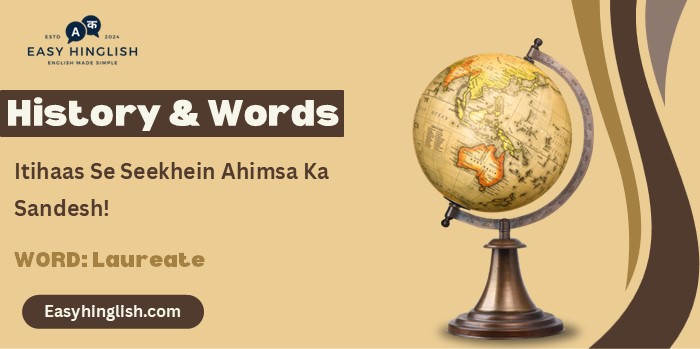History & Words: 'Laureate' (December 10)
Welcome to 'History & Words.' Main Prashant hoon, Wordpandit aur Learning Inc. Network ka sansthapak. Yeh series meri bhasha seekhne ki lagan aur itihas ke prati ruchi ka sangam hai. Har kadi ek shabd aur uss se judi ek tithi par roshni daalti hai, jisse aapka shabdkosh badhta hai aur aap itihas ko gehraai se samajh paate hain. Aaiye, iss safar mein shabdon ke madhyam se samay mein pichhe chalein.
📚 Table of Contents
🔍 Word of the Day: Laureate
Pronunciation: /ˈlɒriət/ (LOR-ee-at)
🌍 Parichay (Introduction)
10 December 1901 ko Stockholm, Sweden mein ek historic moment hua jisne human excellence ko recognize karne ka naya standard set kiya. Is din pehli baar Nobel Prizes award kiye gaye, aur duniya ne "laureate" ka modern meaning samjha - wo vyakti jo exceptional achievement ke liye highest honor receive kare.
Alfred Nobel ka yeh vision tha ki peace, literature, science, aur medicine mein outstanding contributions ko celebrate kiya jaaye. Laureate word jo pehle sirf ancient Greek aur Roman traditions mein use hota tha, ab global recognition ka symbol ban gaya.
Is din se "Nobel Laureate" ban gaya ultimate mark of distinction - ek title jo Einstein se lekar Mother Teresa tak, Gandhi ke nomination se lekar Malala ke win tak - sabko connect karta hai. Yeh moment individual brilliance aur collective human progress ka perfect intersection tha.
🌱 Shabd ka Utpatti (Etymology)
"Laureate" ka origin Latin word "laureatus" se hai, jo "laurel" (tej patta) se related hai. Ancient Greece aur Rome mein laurel wreaths victory aur honor ka symbol the. Olympic winners, successful generals, aur great poets ko laurel crowns se honor kiya jaata tha.
Apollo, jo arts aur knowledge ka god tha, uska sacred tree laurel tha. Is tradition se "poet laureate" ka concept aaya - court poets jo royal patronage receive karte the. Middle Ages mein European courts mein yeh practice continue rahi, aur eventually "laureate" ka meaning expand hua any distinguished honor ke liye.
📖 Mahatvapurn Shabdavali (Key Vocabulary)
- 🔑 Laureate: Kisi special achievement ke liye honored person
- 🔑 Citation: Achievement ka official description aur reason for award
- 🔑 Nomination: Award ke liye suggest karna ya propose karna
- 🔑 Posthumous: Death ke baad diya gaya award
- 🔑 Prestigious: High status aur respect wala
- 🔑 Legacy: Long-lasting impact ya contribution
- 🔑 Accolade: Praise aur recognition ka expression
🏛️ Itihasik Sandarbh (Historical Context)
Recognition systems ki history ancient civilizations se start hoti hai. Greek Olympics (776 BC se) mein olive wreaths, Roman triumphs mein laurel crowns - yeh sab public recognition ke early forms the.
Medieval period mein knighthood, court positions, aur religious honors ne formal recognition systems develop kiye. Renaissance mein artistic patronage aur scholarly societies ne intellectual achievements ko recognize karna start kiya.
18th-19th century mein scientific societies, literary academies, aur professional institutions ne medals, fellowships, aur honors introduce kiye. Royal Society of London, French Academy, aur German universities ne peer recognition ka culture establish kiya.
Industrial Revolution ke saath technological innovations aur social contributions ko recognize karne ki need badhi. Carnegie, Rockefeller, aur doosre philanthropists ne private foundations banaye jo public good ke liye awards dete the.

⏳ Samayrekha (Timeline)
- 776 BC: Olympic Games mein pehle laurel wreaths
- 1341: Petrarch ko pehla modern "poet laureate" title
- 1668: England ka pehla official Poet Laureate
- 1833: Nobel ka janm Sweden mein
- 1888: Nobel ka "living obituary" incident
- 1895: Nobel ka will aur prize foundation
- 1900: Nobel Foundation establish
- 10 Dec 1901: Pehle Nobel Prizes awarded
- 1969: Economics prize add hui
- 2012: European Union ko Peace Prize
🌟 Is Din ka Mahatva (The Day's Significance)
10 December 1901 ko Nobel Prizes ka pehla ceremony ek watershed moment tha. Alfred Nobel, jo dynamite inventor tha aur "merchant of death" ke naam se jaana jaata tha, usne apni entire fortune humanity ke betterment ke liye dedicate ki.
Five categories mein prizes diye gaye: Physics (Wilhelm Röntgen for X-rays), Chemistry (Jacobus van 't Hoff), Medicine (Emil von Behring), Literature (Sully Prudhomme), aur Peace Prize (Henry Dunant aur Frédéric Passy). Har laureate ne human knowledge aur welfare mein exceptional contribution kiya tha.
Stockholm Concert Hall mein is ceremony ne international cooperation ka message diya. Scientists, writers, aur peace activists ko same platform par honor karna revolutionary idea tha. Yeh show karta tha ki human progress mein diverse fields equally important hain.
December 10 Nobel ka death anniversary bhi hai (1896), jo symbolic significance add karta hai. Usne destruction ke liye famous hone se construction aur progress ke champion banne ka journey complete kiya.
💬 Prasiddh Ukti (Quote)
"No person was ever honored for what he received. Honor has been the reward for what he gave." — Calvin Coolidge
🔮 Aaj Ka Matlab aur Chintan (Modern Usage and Reflection)
Aaj "laureate" word Nobel Prize se far beyond extend ho gaya hai. Pulitzer Prize winners, Academy Award recipients, aur National Award winners - sabko various types of laureates consider kiya jaata hai.
Digital age mein recognition systems dramatically change ho gaye hain. Social media influencers, startup founders, aur tech innovators ke liye new forms of accolades develop ho rahe hain. Lekin Nobel Laureate ka status still gold standard remain karta hai - ek recognition jo lifetime of dedication aur global impact represent karta hai.
🏛️ Virast (Legacy)
Nobel Prizes ka legacy yeh hai ki isne merit-based recognition ko international standard banaya. Peace Prize ne diplomacy aur conflict resolution ko promote kiya, jabki scientific prizes ne research funding aur academic careers ko shape kiya.
"Laureate" culture ne educational institutions, research centers, aur think tanks mein excellence ki pursuit ko encourage kiya. Nobel Laureates often become science ambassadors, policy advisors, aur public intellectuals, extending their impact beyond their original contributions.
🔍 Tulnatmak Vishleshan (Comparative Analysis)
1901 mein "laureate" mainly European aur North American context mein limited tha. Today's laureates represent global diversity - Asia, Africa, aur Latin America se increasing representation.
Original focus traditional academic fields par tha, lekin now interdisciplinary work, social entrepreneurship, aur grassroots activism bhi laureate-level recognition receive kar rahe hain. Malala Yousafzai ka youngest Nobel Laureate banna yeh show karta hai ki age aur conventional paths se beyond impact matter karta hai.
💡 Kya Aapko Pata Hai? (Did You Know?)
🎓 Antim Vichar (Conclusion)
10 December 1901 se "laureate" ka meaning transform ho gaya - ancient honor tradition se modern global recognition tak. Nobel Prizes ne human achievement ko celebrate karne ka universal language create kiya.
Aaj bhi jab laureate word sunते hain, tо हमें excellence, dedication, aur service ki याद आती है. Yeh personal achievement नहीं, बल्कि collective human progress का symbol है - एक reminder कि individual brilliance से entire humanity benefit कर सकती है.
📚 Aage Padhne Ke Liye (Further Reading)
- 📘 The Nobel Prize: A History of Genius, Controversy, and Prestige – Burton Feldman
- 📗 Alfred Nobel: A Biography – Kenne Fant
- 📙 Nobel Lectures – Official Nobel Foundation Publications








